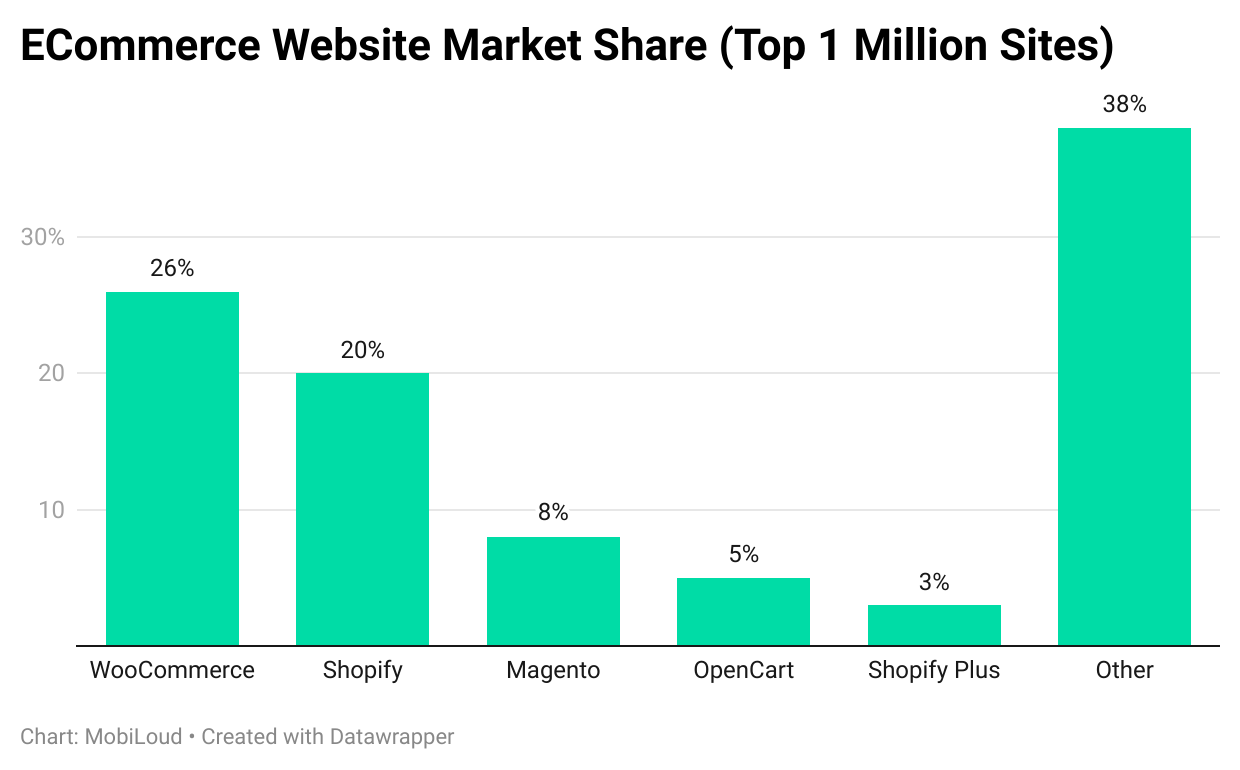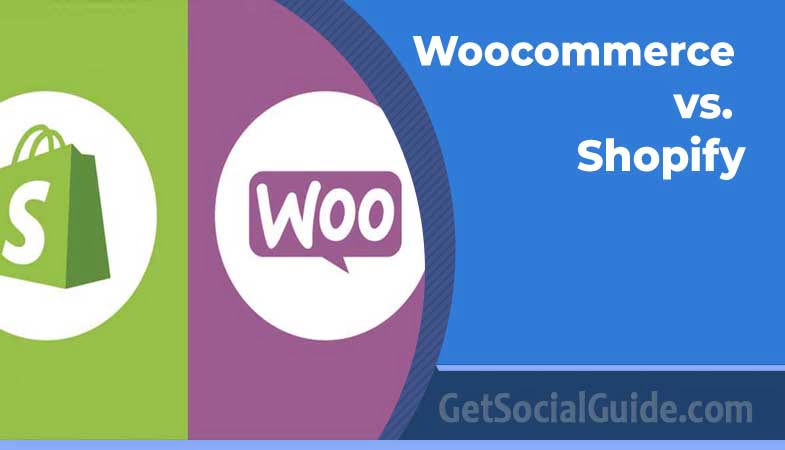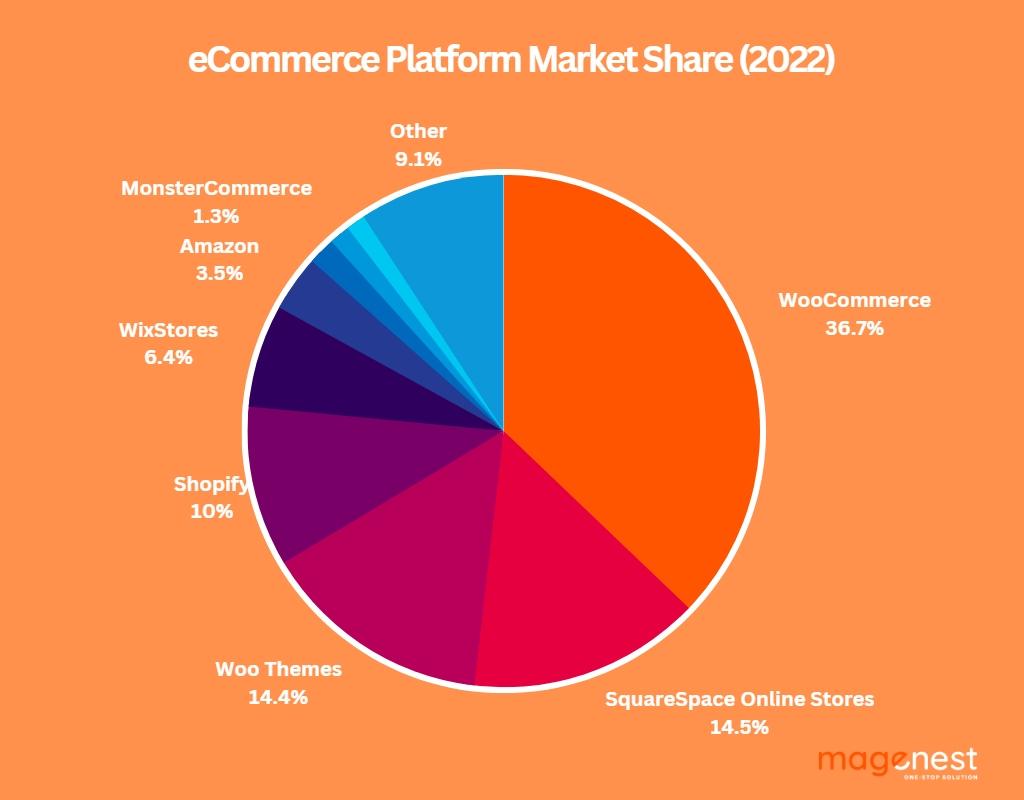Woocommerce vs. Shopify: Which one is better for Ecommerce in 2023
The Ecommerce industry is rapidly growing around the world. The global valuation of the industry stood at $14.3 trillion in 2021. It is expected to grow at a CAGR of 26.55% to reach $58.74 trillion in 2028. Ecommerce continues to be one of the fastest growing industries in the world. If you are planning to join the race, you will need to build an Ecommerce website. And the market is dominated by two key players: Shopify and Woocommerce. Both Shopify and Woocommerce are regularly featured on the list of top platforms to create and manage Ecommerce.
They share a lot of similarities in terms of features and services. It is difficult to pick one over the other. However, both these platforms have some unique aspects that can better serve certain types of Ecommerce businesses. There are certain things one can do better than the other. So you need to understand which platform is better for building your Ecommerce website based on how you wish to run your online store.
Collectively, Woocommerce and Shopify hold 46.7% of the market share of Ecommerce platforms. When you look at the overview of the market share, it seems that Woocommerce dominates. It holds 36.7% of the market share. While Shopify lags with only 10% of the market share. However, the market share changes when you account for the success of Ecommerce businesses built with these platforms.
While there is a significant difference between the market share of Shopify and Woocommerce. This gap shrinks when you analyze the top 1 million Ecommerce websites.  Source
Source
Shopify holds a 20% market share among the top million Ecommerce websites. This is despite only holding a 10% share among all Ecommerce sites. This relative difference is an indicator of the performance and growth capabilities of online stores built with Shopify. On the other hand, the market share of Woocommerce drops by 10%. Yet, it holds the majority of the market share among the top 1 million Ecommerce sites. This indicates the popularity of Woocommerce as well as customer loyalty. Even as these brands grow to enter the top tier, they stick to Woocommerce. This shows that Woocommerce has significant potential to support Ecommerce growth. Both Shopify and Woocommerce show significant promise for creating, managing, and growing Ecommerce brands. But, to make the right choice for your online business, you need to understand the advantages and disadvantages of each of them. Let’s break down how Shopify and Woocommerce differ from each other.
Shopify – The All-in-One Ecommerce Platform
Shopify is an Ecommerce platform. You can use it to create an Ecommerce website, accept payments, manage inventory, and manage the online store. The platform also has additional features for running various business operations and Ecommerce marketing activities. Shopify serves as an all-in-one platform for Ecommerce businesses. The biggest advantage of Shopify is its simple approach to Ecommerce. It removes the need for programming knowledge to create an online store. The platform gives you simple and easy template-like formats to build your Ecommerce website. Furthermore, it gives you similar simple-to-use applications for managing the store and integrating operations with the store. You can integrate the online store with offline operations such as inventory management, shipping, micro fulfillment, accounts management, drop shipping, and more. You also get a plethora of options to run a variety of marketing campaigns including ads, content marketing, SEO, email marketing, and more.
Shopify Ratings
Forbes Advisor Rating: 4.1 Stars G2 Rating: 4.4 Stars Capterra Rating: 4.5 Stars
Pros
- 24/7 customer service
- More than 6,000 apps and plug-ins
- Plans include web hosting and security
- Online and offline POS integrations
- Multichannel Ecommerce management
- Multiple payment processors
- Supports a variety of physical and digital products
- Supports online and offline services
- Integrations for online and offline marketing
- Order fulfillment assistance with discounted shipping rates
Cons
- High upfront cost
- Relatively limited SEO benefits compared to Woocommerce
- Limited content marketing capabilities
- Only a 14-day free trial may not be enough to test the platform
- Limited customization options
- Lack of email hosting
- Difficult exit, transfer, and migration
Woocommerce – The Customizable Ecommerce Plug-in
Woocommerce is an open-source plug-in for creating and managing Ecommerce websites on WordPress. This plug-in allows you to create an online store on WordPress. You can get complete access to the source code. This brings immense possibilities for modifications and customizations. Compared to Shopify, Woocommerce gives you more freedom to design your Ecommerce website. But, you need technical and programming knowledge to explore this freedom. Templates do not constrain you. However, many third-party developers have created a plethora of paid and free templates.
The Woocommerce community has also created numerous plug-ins and integrations. This helps you with a variety of operations including inventory management, payment, sales, shipping, marketing and more. Owing to the WordPress integration, Woocommerce offers an in-built content management system (CMS) with several tools for SEO. Owing to the customizations, you get incredible flexibility with Woocommerce. But, the most attractive aspect of this plug-in is that it’s free. You can start and run your Ecommerce business for free.
Woocommerce Ratings
Forbes Advisor Rating: 4.5 Stars G2 Rating: 4.4 Stars Capterra Rating: 4.5 Stars
Pros
- A highly customizable free-to-use open-source format
- Numerous free themes & templates
- Paid themes & templates with customer support & upgrades
- Plethora of plug-ins for a variety of purposes
- SEO support from WordPress
- Community support
Cons
- You need programming knowledge for customizations
- Many features depend on third-party apps and extensions
- Some important plug-ins can be quite expensive
- Integrations for advanced features are expensive
- You are dependent on the community for a variety of features
- Additional charges for domain registration and hosting
- Woocommerce sites become high-maintenance as they grow larger
- It supports only online sales
- It can be challenging to scale
Shopify vs Woocommerce – Which is Better for You?
Shopify is the better Ecommerce platform if you want to quickly launch your online store without any technical support. However, it comes at a price. But, you will get a lot of help directly from the platform when launching and scaling your businesses. Woocommerce is a better choice if you want flexibility with customizations. You can get started for free. However, you will need technical support to get complete control. You can take help from the Woocommerce community. Furthermore, you can use free and paid integrations to develop your Ecommerce business. The most important thing to remember when choosing one of these platforms is what you wish to achieve.
Shopify and Woocommerce can be advantageous for different types of business strategies. You also need to make a choice based on your current standings, budget, and industry. It is also important to consider your operational requirements. These include supply chain management, financing, marketing, logistics, and so on. They play a crucial role in Ecommerce. So you need a platform that can support your overall business plan rather than just your online store.
AUTHOR BIO: Carl Torrence is a Content Marketer at Marketing Digest. His core expertise lies in developing data-driven content for brands, SaaS businesses, and agencies. In his free time, he enjoys binge-watching time-travel movies and listening to Linkin Park and Coldplay albums.
Twitter – https://twitter.com/torrence_carl
LinkedIn – https://www.linkedin.com/in/torrence-carl/






